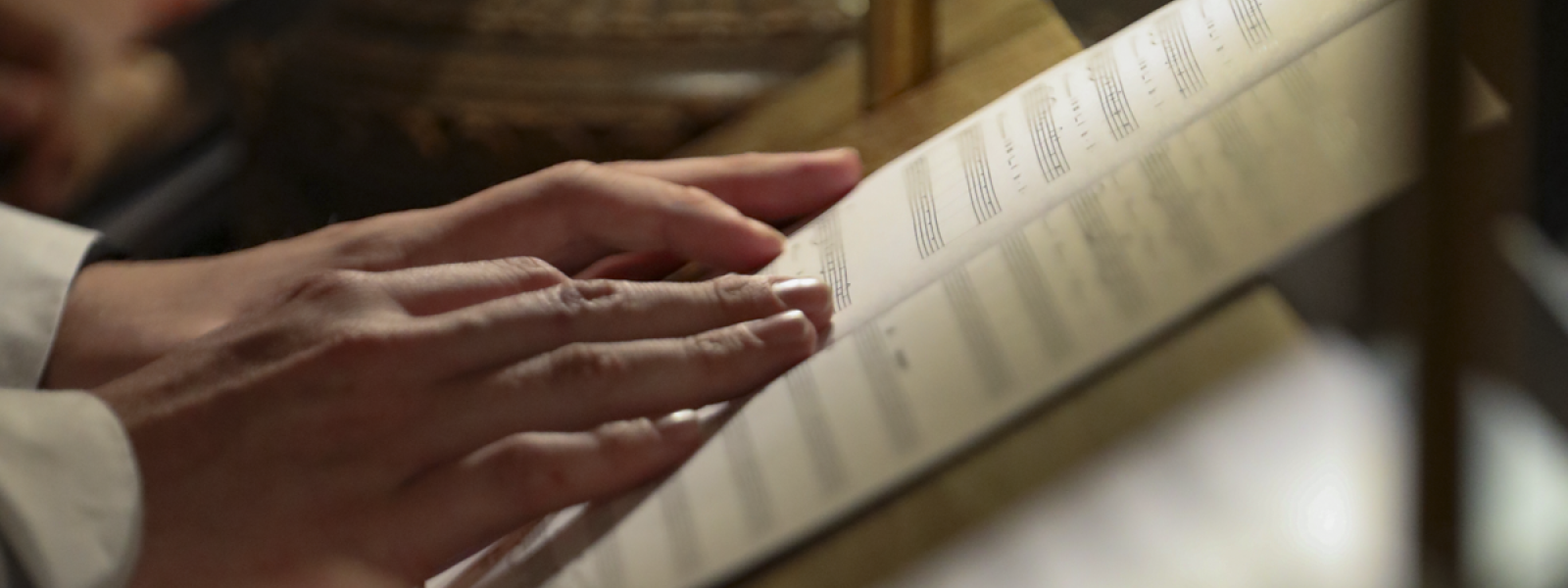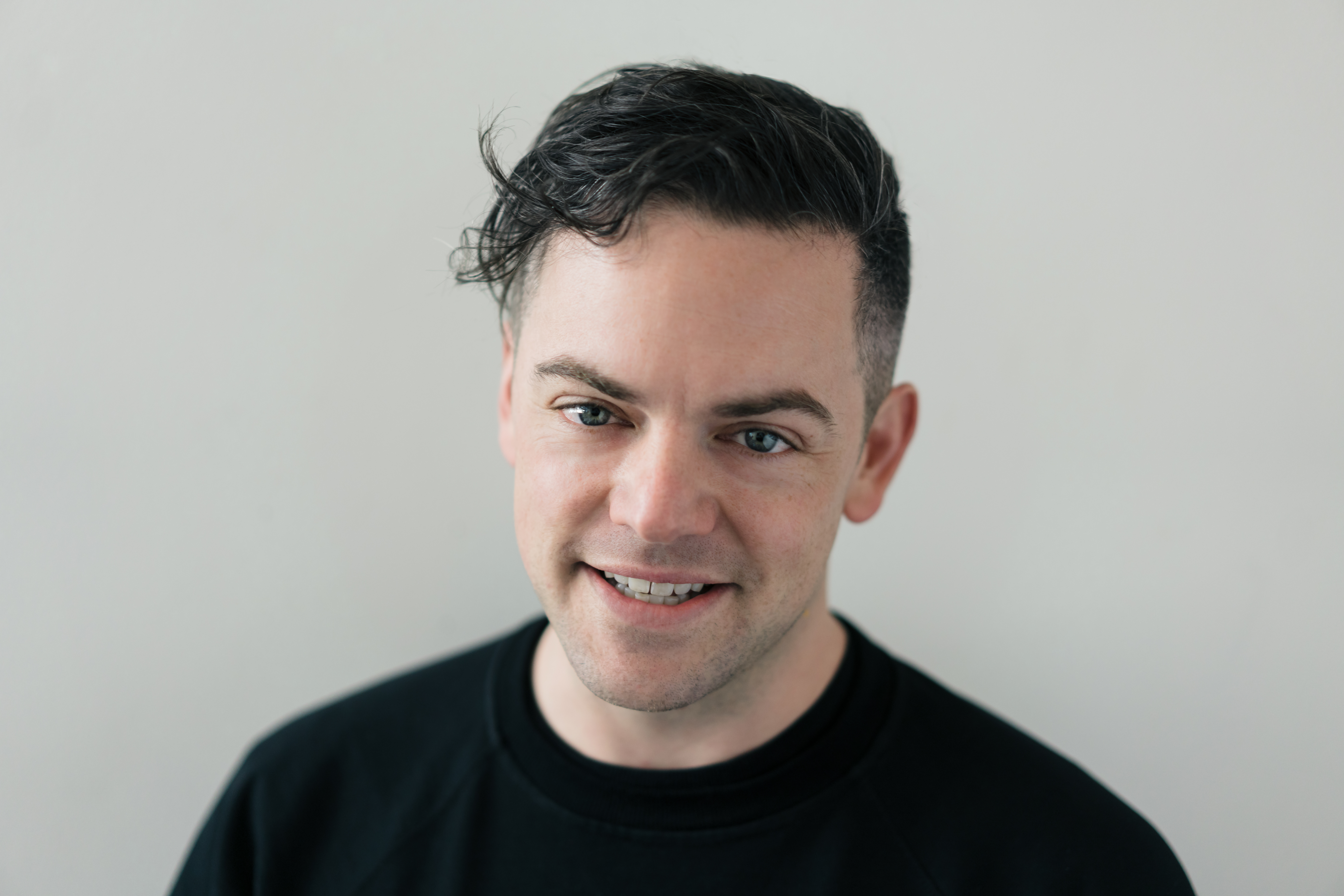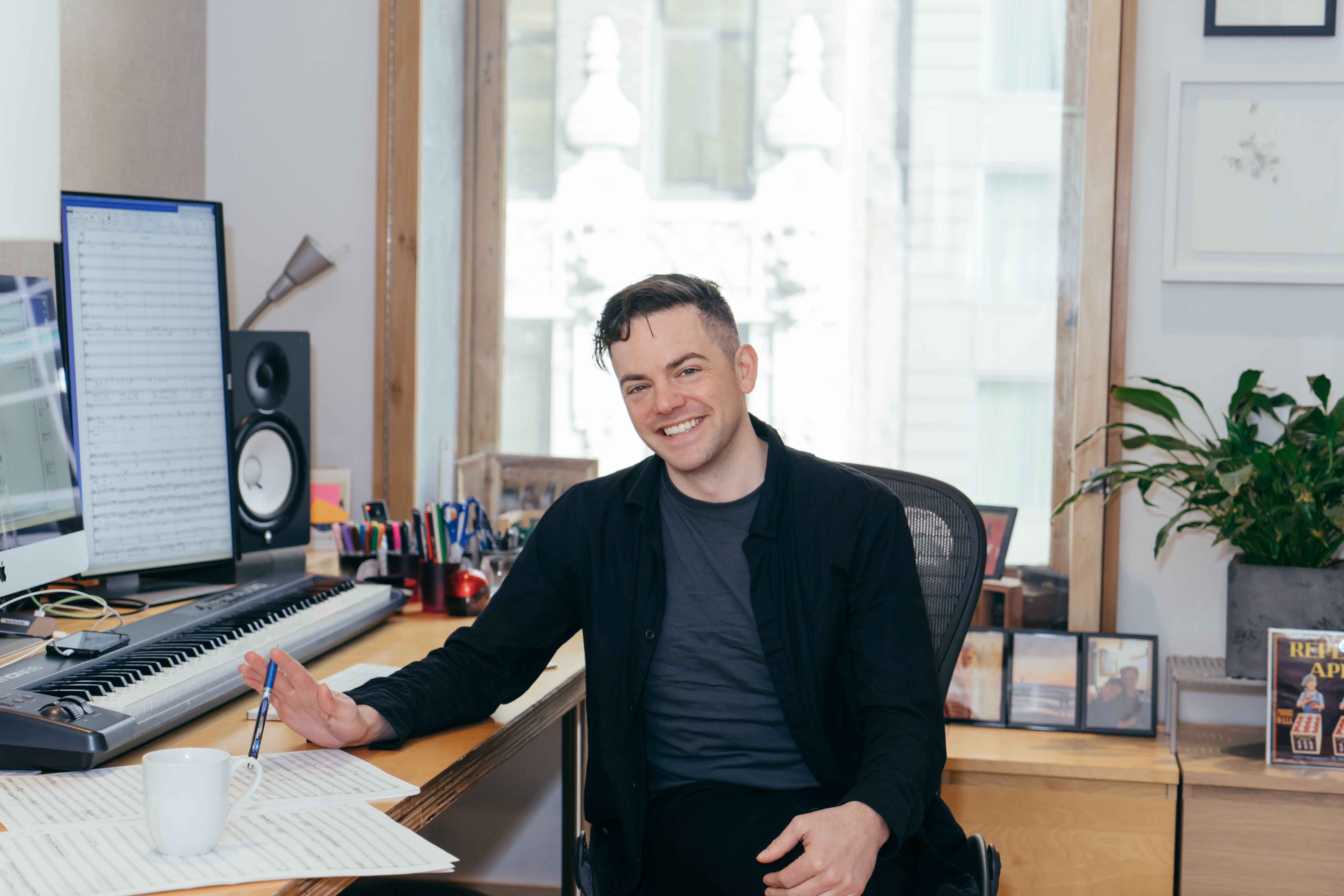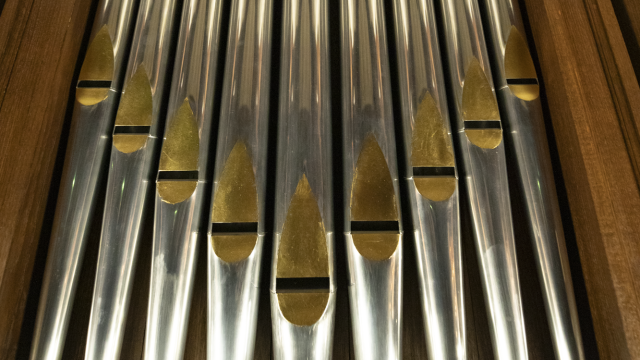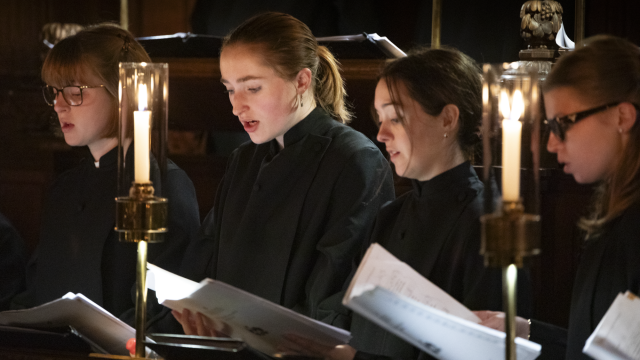The New York-based composer and arranger Nico Muhly has worked with some of the most celebrated orchestras, operas and ballet companies in the world.
His Throughline was nominated for a Grammy for Best Orchestral Performance. He has composed soundtracks for films including The Reader, and TV series including Pachinko (Apple TV) and Howards End (BBC), is a founding member of the Reykjavík-based record label Bedroom Community, and has collaborated with pop, rock and electronic music artists including Paul Simon, Bjork and The National.
The son of a visual artist and a filmmaker, Nico enjoyed a peripatetic childhood. A musical ‘late bloomer’, he joined a boys’ choir aged 11 and can still recall his first experiences of choral music, Benjamin Brittain’s Te Deum in C, ‘corkscrew(ing) into (his) pre-teen consciousness’.
Despite an unconventional musical education, he gained a place on a prestigious joint degree programme at Columbia University and the world-renowned Juilliard School. Surrounded by contemporaries who had ‘started violin at 11 months’, and dividing his time between his studies and a developing role supporting the renowned composer Philip Glass, Nico has been extraordinarily prolific, and in the two decades since graduation he has continued to explore a wide range of new classical and sacred music.
Nico’s music has been hailed by Gramophone magazine as ‘as quick and clever as he is, brimming with tropes and tricks’. His catalogue includes a monodrama about the mathematician and codebreaker Alan Turing and three operas: Dark Sisters (2010), Two Boys (2011), and Marnie (2017).
In 2020, Nico agreed to become Sidney’s latest Composer-in-residence: ‘I'd known David (Skinner, Fellow and Osborn Director of Music), but with kind of one degree of separation. He called me up and said, “I've been doing this thing with composers, would you be interested?” And I said, “Absolutely.”’
You started piano at the age of 10, which is relatively late, and joined a boys’ choir aged 11: securing a place at Juilliard must have felt like quite an achievement.
‘Yes, I still don’t know why they let me in!'
And you enrolled in a joint degree - why not focus solely on music?
‘Well, at the time I wasn't 100 per cent sure what I wanted to do. I knew I loved reading, I loved writing, I loved just kind of knowing.
‘I remember visiting Juilliard when I was in my last year of high school - I had a friend who was there. She explained that, at Juilliard, there was just one (non-music) class called Humanities, and basically you read Gilgamesh… or maybe To the Lighthouse. Coming from a world of books, in addition to a world of music, that (lack of reading) was quite shocking to me. So the option of the dual-degree programme sounded amazing.
‘At Columbia, I was just a normal liberal arts student. I ended up as sort of an English major, with a focus on post-colonial work. I studied with Edward Said and Gayatri Spivak among others- it was a fantastic time to be there.’
You are known as a prolific composer, and I read that you had that reputation even as an undergrad. Was Juilliard the opening of that bottle?
‘Well, what I'll say is that when I arrived at Juilliard, I had a skill, which was also my shortcoming - I was able to generate a lot of music, which isn't to say finished pieces, just music: ideas and gestures.
'And the challenge for my teachers was harnessing that into something that had structure and purpose, so I wasn't just producing a million little tapas.
‘I was lucky because my teacher, John Corigliano, helped me figure out how the architecture of music could work, which meant I was able to maintain that high productive energy, but use it for good, rather than chaos!’ (laughs)
I’m wondering what the ‘million little tapas’ - those fragments - say about how you view music, and what the role of music is in your life? Are you trying to articulate a particular emotion at that moment, or explore an idea?
‘Well, now there are no fragments. Now everything is, you know… things are put to use.'
Yes, sure, but at some point there were fragments. I know you have also spoken about being bipolar, and I wonder if that had an impact?
‘Well, I mean, I try hard to never romanticise bipolar disorder, which I think is very easy for people to do, right? You know, people say “it must be a gift” and I always say, “I wish I’d kept the receipt.” I wouldn't wish this on anybody.
‘So, I don't think it was necessarily connected, but I also think it wasn't unrelated to an excess of mental energy, or mental activity… and also to an inability to focus on one thing, or – because this is equally true - the opposite of that, an ability to go really deep into one thing.
‘It's difficult to know what the “pilot light” is that triggers creativity, and I also feel like if I did figure it out, maybe there wouldn't be any mystery anymore and, maybe, the game would be over.’
You worked for Philip Glass.
‘Yes, I first met Philip Glass when I was 18. He owned a recording studio in Soho, and there was an internship programme that was actually for that studio, not necessarily for him. And so I started doing intern stuff - answering the phone, taking out the trash, making coffee.
‘He then needed someone who had a really specific troika of skillsets - the ability to read his manuscript, and his manuscript is actually pretty clear; the ability to play his manuscript; and the ability to input it as a performance into the computer, to make a demo.
‘I could read his manuscript; I could play it convincingly as a flute, as an oboe, as a clarinet; I totally didn't know how to use that software - I lied viciously and said I did, then figured it out!
‘I then became a more regular employee, through both my undergrad and my Master's.’
And did you tell him you were also composing?
‘Not in any active way, because I didn't want to have that kind of ‘thirsty’ relationship. I wanted to be in his ecosystem, as a crucial part, not as someone who was angling for something. Of course he knew I composed, but I didn’t want to let that get in the way.
‘I worked with Philip forever, and it was amazing. The only disadvantage, or perhaps a shading to it, was that it was really full-on. When he was working on a film, I was essentially full-time if you added up the hours, but also going to Columbia and Juilliard, so my life became this really complicated jigsaw puzzle.
‘It also meant that I couldn’t do any summer festivals. So, there was a bit of FOMO - I was foully jealous of my friends who were photographing themselves in front of mountains and pastoral vistas, while I was like, arpeggiating in Soho (laughs)… but I had a job that gave me healthcare, in classical music. It ended up okay!’
There must've come a point where you did talk to him about your work.
‘Well, yes, absolutely. I mean, there was a very long cross fade after I realised I was getting enough work as a composer. Around that time, I also had this big crazy concert in New York, and he came to it and it was great. It felt like a natural transition point.
‘I mean, Philip is great, and I feel like I learned so much, in terms of how to collaborate honestly, and how to be egoless in a collaboration. He'd write a beautiful cue for a film or whatever, and the director would say, ‘No, this doesn't work.’ And instead of pushing back or whatever, he'd just say, ‘Okay,’ and write another one.
‘I had also worked very hard on making demos of those cues, so I was about to fight this guy: “This took me a week!” (laughs) But Philip was like, “Okay,” without a moment’s hesitation.'
You mentioned collaboration. Your father was a filmmaker, and your mother a visual artist. Do you think your experience of growing up in a broad creative environment has helped you understand creatives working in different media?
‘To a certain extent, but I think I learned quickly that collaboration and collaborative projects access the same sort of musculature as solo work, but they are also very, very different and require a malleability of your own skills.
'Collaboration is not for everybody, and I have friends who find being in collaborative relationships very stressful, because they feel themselves to some extent “erased”.
‘I was always drawn towards it. When I graduated, I was 22 years old, and the myth was that if you were talented and worked hard the phone would ring and it would be the London Sinfonietta. They would commission this big piece from you, and that would be it.
‘That's really not how it works, and so I was really willing to work with friends who played in rock bands, and with animators and artists. I did that work not out of necessity, but out of a willingness to extend into different opportunities. And that's been, I think, one of the governing energies of my adult life.’
So, what attracted you to the role at Sidney?
‘Well, I think we can say that Sidney punches above its weight for music. I think it’s a very special situation with David and how he's formed and shaped that choir and what their projects are — take the recent recording of Jheronimus Vinders!
‘And it's very unexpected. When you look at the service list and the music, it's certainly not ‘paint by numbers’. They’re perfectly happy to put a meat-and-potatoes bit of Howells next to some undeservedly obscure 16th century motet. There’s a deliberate eccentricity but genuine interest in things that fall outside of that.'
So, what does a Composer-in-residence do?
‘Well, there's no blueprint. I, however, have my own thought about this, which is that if you're a Composer-in-residence anywhere, or if you have an affiliation with any institution, specifically an educational one, it can't be that you just write three anthems in the same number of years. The role really has to be woven into the fabric. Otherwise, it's just a bunch of commissions from the same person.
‘So that's what I've been trying to do - to develop a body of work. I’ve written a psalm chant, a set of responses, a million organ preludes and postludes: smaller things which aren’t “flashy” in themselves but which, taken as a whole, should represent almost a complete set of service music.
‘What I think is so special (about sacred music) is understanding that in Cambridge, in Oxford, in London, in Liverpool and in Norwich, at 4.45 or whatever on a Tuesday, the Song of Mary is being sung. And that's amazing.
‘Writing a set of canticles doesn’t need to be a big deal: It's like dropping a paper boat into a stream, right?
‘So, I'm invested in doing more, smaller things.’
The history of sacred music is long. Compared to when you are writing music completely independently, and presumably you are under your own steam and to some extent looking for something new, do you find yourself dipping into those traditions? Are there conventions you need to follow, or conform to?
‘Well, I don't consider it conforming in the least.
‘There is a huge tradition that has an enormous power, and I think there's something beautiful about entering into that conversation.
‘If someone says, “Write a set of canticles”, you make a list of things that are true: people will be standing when they're being sung; they will be invited to reflect on a reading; they will be performed at a very specific time of day, a specific time of year.
‘You also know how much rehearsal time you're going to get, and this is something people don't necessarily understand about sacred music: rehearsal is fast. I mean, if you have something at Westminster Abbey or any grand place, really, the boys of course will have rehearsed for a generous amount of time, but once the Lay Vicars come, it’s a very, very quick rehearsal process. The trick is to write music which should be easier to put together than it sounds! So, I think about the rehearsal time, and when I'm writing for children's voices, which I do a fair amount, I ask myself what challenges I would have liked when I was that age.
‘For me, Britten’s Te Deum in C was one of the first pieces where I thought, ‘I feel like this was written directly into my brain.’ It corkscrewed into my preteen consciousness. Every decision about what the Trebles had to do - and there's that beautiful Treble solo - felt like it had been written by someone who knew what kind of challenges we - specifically me - wanted. It was hard but rhythmic, but floating, but special, but traditional. So, I think about that when I'm writing for younger voices.
‘So, you read the room, but in saying that I'm not saying in any way that you can't be innovative in choral music. If I had to make a list of the top contemporary pieces of sacred music in this tradition, I think the Tippett St. John's service would be a great example, and it’s hard and it's weird. You have Judith Weir’s Illuminare, Jerusalem and you have the Adès Fayrfax Carol, which is incredibly difficult and very beautiful and harmonically unstable.'
And you clearly enjoy writing this music.
‘Yes, for me it is such a delight to write. I find it really joyful.
‘My connection with that tradition is something I don't think I could go without.
‘It’s like… do you ever have this feeling, when you possess a plane ticket: even if the flight’s not for some time, you know you're going to go somewhere at some point, and that’s an amazing feeling. That's how I feel if I have choral music even on the most remote backburner in the backyard – I know I'll have this wonderful vessel, at some point.’
You are renowned for working on multiple projects simultaneously, so what else is on your ‘to do list’ right now?
‘Well, I'm currently scoring a Dodie Smith play, Dear Octopus, which will open at the National Theatre in February - the minute I hang up from you, I'm going to write a transition for that.
‘I'm writing a piano concerto for the French baroque pianist Alexandre Tharaud, and a ballet for the choreographer - and my old friend - Benjamin Millepied, which is happening in Paris in the Philharmonie in April. What else am I doing..?’
Perhaps I should let you get on…
‘Yeah, you shouldn't have asked me (laughs). I'm looking at my folders and thinking, “What is that?”’
Is it scaring you?
‘No, no, no, it's all good, it's all good. This is something I learned from Philip – you’ve just got to get on with it. Get up early, haul your ass to the studio, just do it.
‘You can't torture yourself, or you'll go crazy… and you can't worry about what other people think… or you'll go crazy.’ (laughs)
If you have something that would make a good news or feature item, please email news@sid.cam.ac.uk
